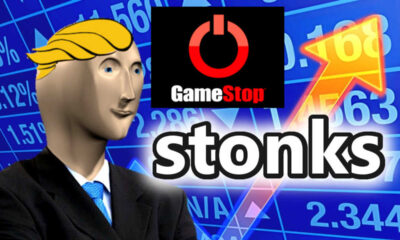Business
Groupon Is Overhyped and Overexposed — Here’s Why RDE, Inc. Is a Better Alternative
In the last month or so, Groupon’s been on a little bit of a recovery bull run following some hype in the financial press. But don’t buy into it — Groupon remains overhyped and overexposed, plain and simple. Here we explain why, and then give you some better options if you’re looking to cash in on a similar opportunity.

It’s common knowledge that in every crisis, there’s opportunity.
It’s also common knowledge that we’re living in a crisis right now.
Logically, that means opportunity abounds right as we speak.
So where is it?
Well, let me give you a hint using a few headlines that recently cropped up in the financial press.
- Groupon Shares Spike. The Stock Could Triple From Here. (Barron’s)
- Groupon Shares Surge on New Buy Rating and $30 Target Price. (Seeking Alpha)
- Why Groupon Stock Was Soaring Today (Motley Fool)
Those headlines appeared after analysts gave Groupon [NASDAQ: GRPN] a strong buy rating.
And that buy rating was, in a very big way, driven by the crisis we’re living in right now.
So what is this crisis?
Let me give you a few more headlines so we’re all on the same page:
- Two Out of Three Workers Say Prices Are Still Rising Faster Than Wages (CNN)
- The American Dream Is No Longer About Getting Rich, Owning a Home for Small Business Owners, Survey Finds — Here’s What the Cost-Of-Living Crisis Has These Folks Chasing Instead (Moneywise)
- Americans Earning Less Than $100K Struggle to Afford Day-To-Day Living Expenses (The Hill)
- Paying For News: Price-Conscious Consumers Look for Value Amid Cost-Of-Living Crisis (Reuters Institute)
Now, if you want to stop reading here and just go out and buy Groupon, then more power to you.
But, before you do, consider this — there are much better alternatives out there like Restaurant.com parent company, RDE, Inc. [OTCQB: RSTN] for taking advantage of the cost of living crisis.
So stick around for a minute to really dig into what’s going on here (and discover why there are better opportunities than Groupon).
Here’s Why Groupon Shares Are Way Up
The news about Groupon [NASDAQ: GRPN] shares spiking was based on a 16% single-day gain.
That gain was precipitated by analysts giving the stock (which is currently hovering around the $12 mark right now) a $30 target.
As for why that price target was set, here’s a quote from Roth MKM analyst Sean McGowan:
“Now, consumers’ savings have been depleted, inflation has reduced purchasing power, and a recession may be looming, we believe this will result in a strong upswing in Groupon’s revenue.”
So why are depleted savings, inflation, and a looming recession driving Groupon’s share price up?
That’s simple.
Groupon is a famous online marketplace where people go to get big discounts on things. To steal the words right off of its app description, it’s a place where consumers can save “70% on the things [they] need every day.”
If we put two and two together, a cost of living crisis should drive demand for discounts sky-high. What logically follows is that any place that offers discounts should benefit from this increased demand.
And, as it turns out, Groupon has.
In fact, Groupon has benefited so much that its stock has skyrocketed by a lot more than the 16% jump that prompted the news we opened with.
So much so that its share price has almost quadrupled in the last six months, rising from around the $3 mark in April/May to about $12 today.
Read that again.
Groupon [NASDAQ: GRPN] shares have quadrupled in value over the last six months.
That’s massive.
The Problem With Groupon
While the logic for Groupon [NASDAQ: GRPN] shares going up in a cost of living crisis is solid, the company itself may not be.
Here, there are a couple of concerns, starting with Groupon’s significant exposure outside of its pure discounts play.
Exposure Concern #1 — Fintech Headwinds
To illustrate Groupon’s exposure outside of its core “discounts” offering, take a look at what reared its ugly head just days before the good news. Here’s the headline:
- Groupon Stock Plunges as Valuation of Stake in SumUp Falls by Half (Barron’s)
SumUp, for the unfamiliar, is a Fintech payments play. And, as it turns out, it represents a pretty significant chunk of Groupon’s valuation.
In fact, even after the valuation of SumUp fell by half, Groupon’s stake was still worth $94 million dollars (after being initially valued at around $200 million).
For reference, Groupon’s market cap is somewhere around the $365 million mark, meaning that stake represents about 25% of Groupon’s valuation.
That poses a significant threat of applying some serious downward pressure on Groupon’s stock. Especially when we consider the headwinds facing fintech right now.
To quote KPMG’s biannual “Pulse of Fintech” report, “Heading into the second half of 2023, market challenges are expected to continue — which could make for another bumpy six months.”
Exposure Concern #2 — Core Product Exposed to Declining Markets and a Potential Recession
Groupon’s exposure to additional headwinds extends further than just fintech.
In fact, its core product faces significant exposure.
To provide an exhaustive list of risks here is beyond the scope of this article. But, a quick browse through the Groupon categories soon reveals exposure to a few industries facing a significant downturn.
One example is the “pets” category.
FYI, pet ownership is currently in steep decline, with the latest figures showing the number of households owning pets in the US fell from 70% in 2021 to 66% in 2022.
Another example of this comes from the “getaways” side of the Groupon offering.
This is a side that has largely benefited from what we’ve now come to know as “revenge travel” — the post-Covid surge in demand for travel as people resumed previously canceled travel plans.
But, as revenge travel slowly starts to wane, and spending on big-ticket items (such as travel) tightens, there’s a good chance Groupon will get caught in the squeeze.
Finally, we also have one other little detail that can’t be overlooked — analysts are probably late on this call.
To illustrate, cast your mind back to the observation we made before about Groupon’s stock price quadrupling in six months.
That sort of price action doesn’t usually happen unless some serious “expectations” are built into it. And if those expectations are based on increasing discount-seeking behavior, then analysts are a little late in making this call.
There Are Better Ways to Capitalize on the Cost of Living Crisis — Restaurant.com (RDE, Inc. | OTCQB: RSTN)
Before we get to better alternatives to Groupon, let’s summarize the above:
- Groupon will benefit from the cost of living crisis as consumers increasingly seek discounts.
- However, Groupon’s other holdings expose it to downward pressure.
- Groupon’s core offering is also exposed to headwinds due to reliance on industries that are declining and/or don’t do well in a recession/cost of living crisis.
When summarized like that, it makes finding better alternatives simple — we want to keep the first point and eliminate the other two.
One stock that does exactly that is RDE, Inc. [OTCQB: RSTN].
Here’s why.
- RDE’s flagship brand, Restaurant.com, is premised on providing steep discounts in a recession-proof industry.
- In fact, out of the last six recessions, the industry has only suffered one major decline. That decline was (no surprises here), during the Covid pandemic. The only other decline on record was a slight dip in the wake of the housing bubble.
- RDE’s only exposure outside of food services is limited to its recent CardCash.com acquisition — a B2C and B2B exchange platform for, would you believe it, discounted gift cards.
- The tailwinds for CardCash.com are twofold. First, on the consumer side, we have the lure of discounted gift cards during a cost of living crisis. Second, on the B2B side, we have increased demand for gift card inventory to run discount-equivalent incentive programs. (It’s fairly common knowledge that gift cards are a strong alternative to pure discounts.)
To learn more about each of RDE’s businesses, I suggest you check out these articles:
- Restaurant.com: Details how Restaurant.com works, and directly compares is to competitors like Groupon.
- CardCash.com: Details the strengths of the CardCash.com business, and how RDE’s acquisition unlocks massive synergies with its Restaurant.com business.
—
(Featured image by Groupon (CC-BY-2.0) via Flickr)
DISCLAIMER: This article was written by a third party contributor and does not reflect the opinion of Born2Invest, its management, staff or its associates. Please review our disclaimer for more information.
This article may include forward-looking statements. These forward-looking statements generally are identified by the words “believe,” “project,” “estimate,” “become,” “plan,” “will,” and similar expressions. These forward-looking statements involve known and unknown risks as well as uncertainties, including those discussed in the following cautionary statements and elsewhere in this article and on this site. Although the Company may believe that its expectations are based on reasonable assumptions, the actual results that the Company may achieve may differ materially from any forward-looking statements, which reflect the opinions of the management of the Company only as of the date hereof. Additionally, please make sure to read these important disclosures.

-

 Africa2 weeks ago
Africa2 weeks agoCôte d’Ivoire Unveils Ambitious Plan to Triple Oil Output and Double Gas Production by 2030
-

 Business1 week ago
Business1 week agoThe TopRanked.io Weekly Digest: What’s Hot in Affiliate Marketing [NordVPN Affiliate Program Review]
-

 Cannabis3 days ago
Cannabis3 days agoCannabis Company Adopts Dogecoin for Treasury Innovation
-

 Biotech1 week ago
Biotech1 week agoPfizer Spain Highlights Innovation and Impact in 2024 Report Amid Key Anniversaries




![RDE, Inc. [NASDAQ: RSTN] hits the Nasdaq](https://born2invest.com/wp-content/uploads/2024/08/rde-inc-hits-the-nasdaq-400x240.jpg)
![RDE, Inc. [NASDAQ: RSTN] hits the Nasdaq](https://born2invest.com/wp-content/uploads/2024/08/rde-inc-hits-the-nasdaq-80x80.jpg)


















